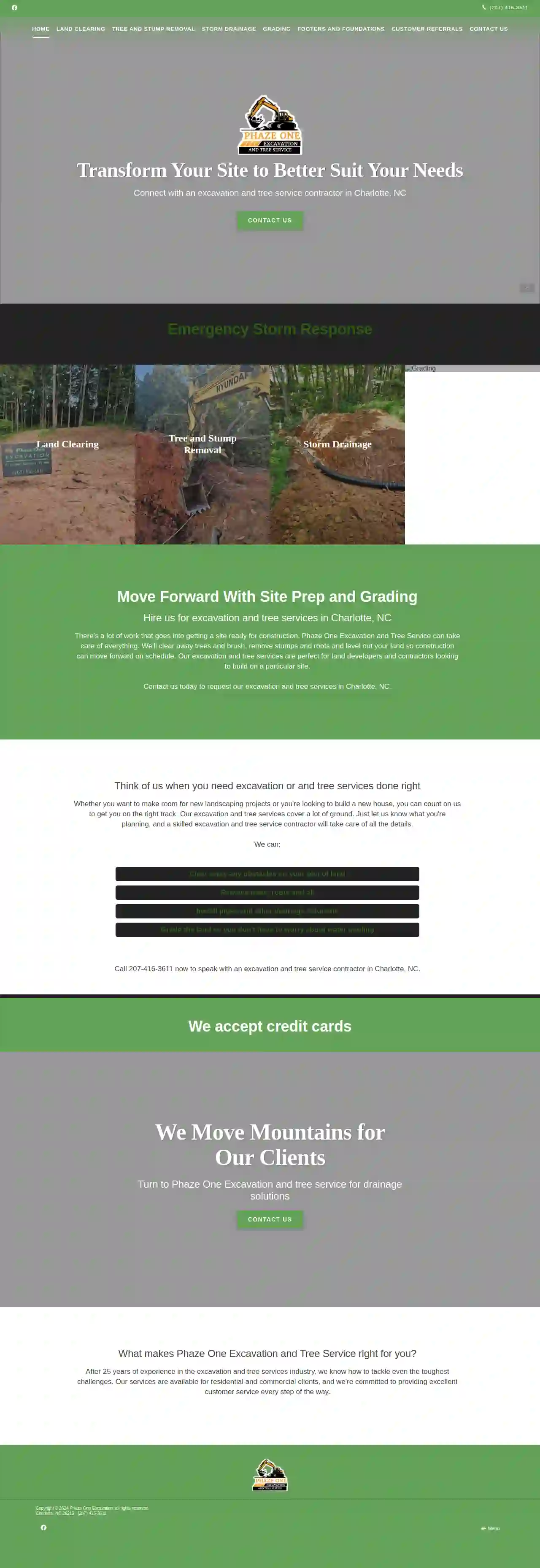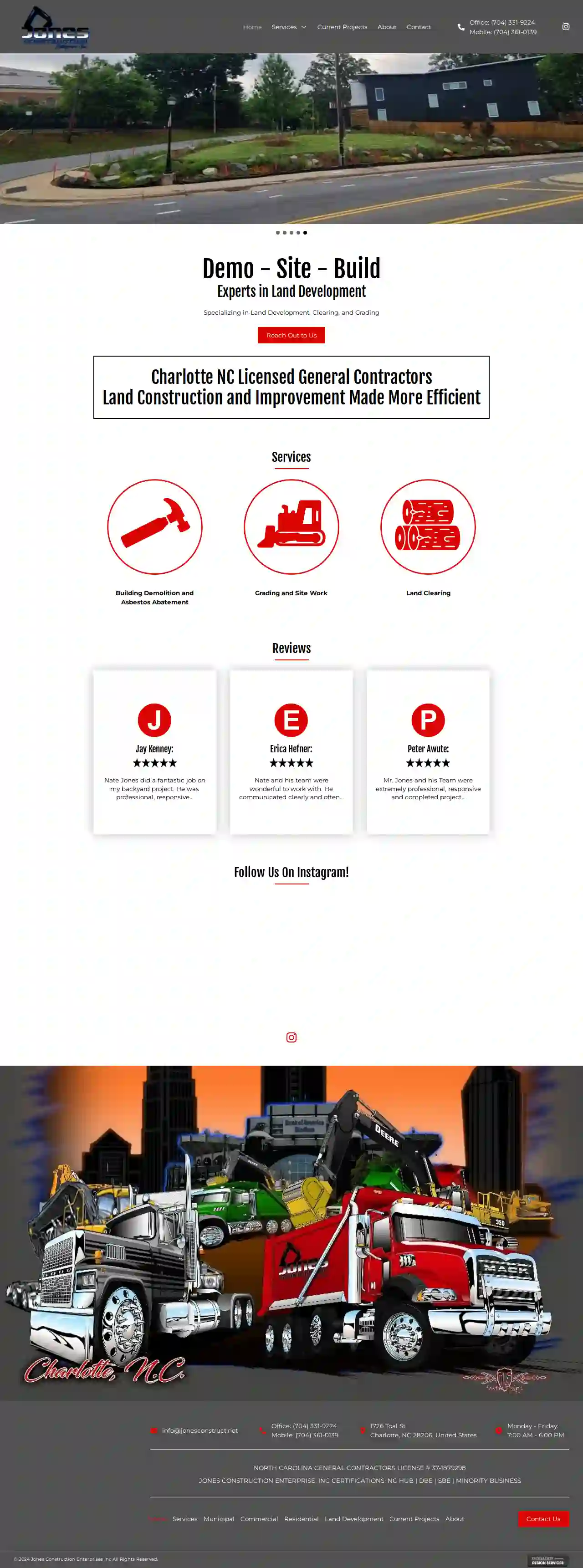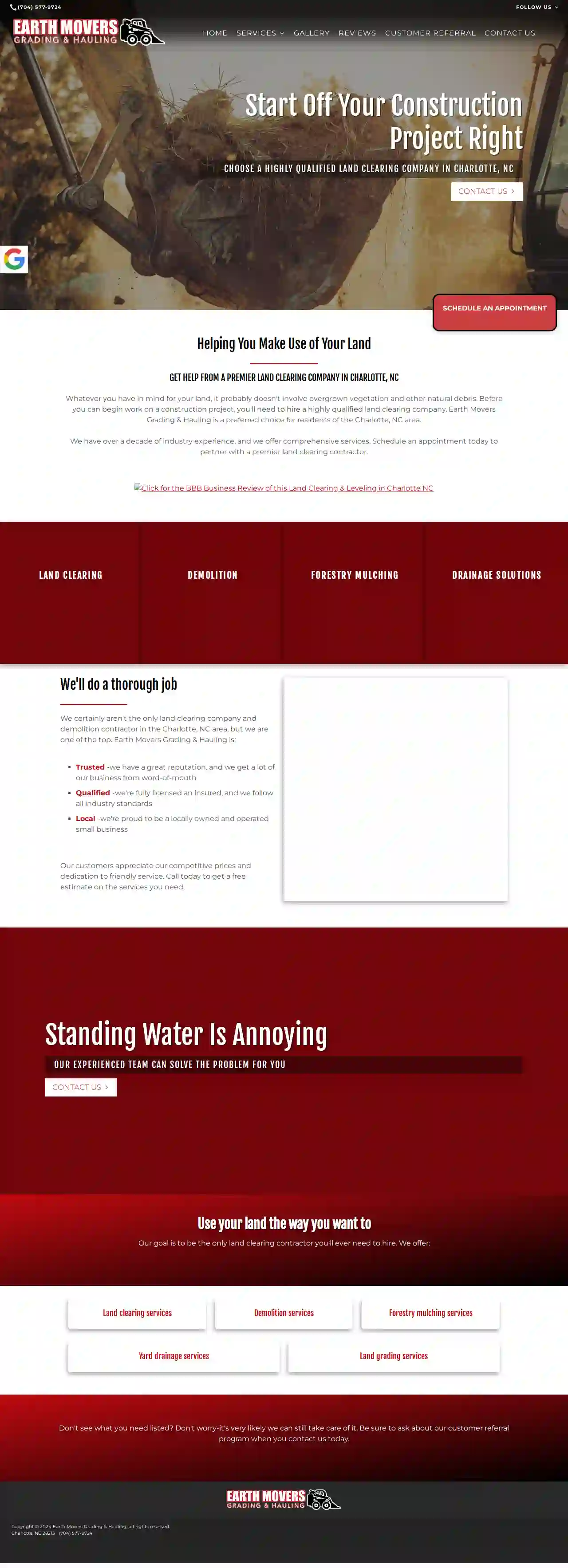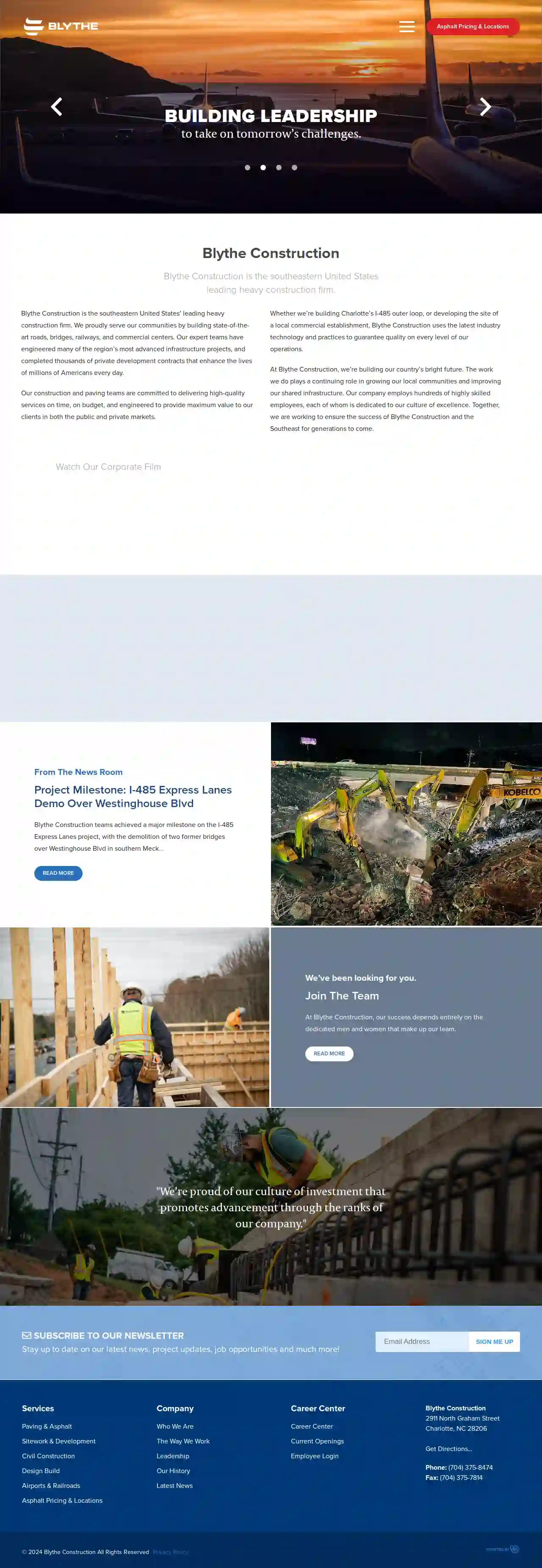Demolition Contractors Charlotte
Find top Structure Demolition in Charlotte
Get up to 3 Demo Contractors quotes for your project today! Compare profiles, reviews, accreditations, portfolio, etc... and choose the best offer.

Phaze One Excavation
54 reviewsCharlotte, 28213, USTransform Your Site to Better Suit Your Needs Connect with an excavation and tree service contractor in Charlotte, NC There's a lot of work that goes into getting a site ready for construction. Phaze One Excavation and Tree Service can take care of everything. We'll clear away trees and brush, remove stumps and roots and level out your land so construction can move forward on schedule. Our excavation and tree services are perfect for land developers and contractors looking to build on a particular site. Contact us today to request our excavation and tree services in Charlotte, NC. Whether you want to make room for new landscaping projects or you're looking to build a new house, you can count on us to get you on the right track. Our excavation and tree services cover a lot of ground. Just let us know what you're planning, and a skilled excavation and tree service contractor will take care of all the details. We can: Clear away any obstacles on your plot of land Remove trees, roots and all Install pipes and other drainage solutions Grade the land so you don't have to worry about water pooling Call 207-416-3611 now to speak with an excavation and tree service contractor in Charlotte, NC. After 25 years of experience in the excavation and tree services industry, we know how to tackle even the toughest challenges. Our services are available for residential and commercial clients, and we're committed to providing excellent customer service every step of the way.
- Services
- Why Us?
- Gallery
Get Quote
Jones Construction Enterprise's, Inc
4.964 reviews1726 Toal St, Charlotte, 28206, USHire Our Land Developers for Your Next Construction Project Jones Construction Enterprises, Inc. is a full-service construction company specializing in land development, residential, commercial, and municipal projects. We are committed to providing our clients with the highest quality construction services at competitive prices. Our team of experienced professionals is dedicated to delivering projects on time and within budget. We are proud to be a minority-owned business and are committed to providing opportunities for all. Learn More Get a Quote
- Services
- Why Us?
- Gallery
Get Quote
Earth Movers Grading & Hauling LLC
56 reviewsCharlotte, US- Services
- Why Us?
Get Quote
Blythe Construction Inc
3.444 reviewsCharlotte, US- Services
- Why Us?
Get Quote
Over 3,943+ Excavation Contractors registered
Our excavation companies operate in Charlotte & surrounding areas!
ExcavationHQ has curated and vetted the Best Excavation Contractors in and around Charlotte. Find a trustworthy pro today.
Frequently Asked Questions About Demolition Contractors
- Project Assessment: The demolition contractor evaluates the structure, site conditions, and project requirements.
- Permitting: Obtain necessary demolition permits from local authorities.
- Site Preparation: Secure the site, disconnect utilities, and remove any valuable or reusable items.
- Hazardous Material Abatement: Professionally remove asbestos, lead paint, or other hazardous materials if present.
- Demolition: Execute the chosen demolition method, bringing down the structure safely and efficiently.
- Debris Removal and Site Cleanup: Sort, process, and dispose of demolition debris responsibly. Clean up the site to prepare it for future use.
- Site Security: Secure the demolition site with fencing and warning signs to prevent unauthorized access.
- Personal Protective Equipment (PPE): Workers should wear appropriate PPE, including hard hats, safety glasses, gloves, and steel-toe boots.
- Hazardous Material Removal: Properly identify and remove asbestos, lead paint, or other hazardous materials before demolition begins.
- Utility Disconnections: Disconnect all utilities, such as electricity, gas, and water, before demolition.
- Controlled Demolition Techniques: Employ controlled demolition methods to minimize risks and ensure the structure comes down safely.
- Dust Control: Implement dust suppression measures, such as water spraying or misting, to reduce airborne particles and protect air quality.
- Emergency Planning: Have an emergency plan in place, including communication protocols and evacuation procedures, in case of unforeseen events.
- Implosion: Using explosives to collapse a structure inwards rapidly. Suitable for large buildings in open areas.
- Wrecking Ball: Swinging a large steel ball to impact and break down the structure. Effective for bringing down walls and other solid elements.
- High-Reach Demolition: Utilizing specialized excavators with extended arms and demolition attachments for dismantling tall structures piece by piece.
- Selective Demolition: Removing specific parts of a building while preserving other sections. Often used in renovation projects.
- Deconstruction: Carefully dismantling a building to salvage reusable materials, reducing waste and environmental impact.
How can I tell if my building contains asbestos?
What are the steps involved in a typical demolition process?
What are the safety precautions for demolition?
What are the different types of demolition?
How can I tell if my building contains asbestos?
What are the steps involved in a typical demolition process?
- Project Assessment: The demolition contractor evaluates the structure, site conditions, and project requirements.
- Permitting: Obtain necessary demolition permits from local authorities.
- Site Preparation: Secure the site, disconnect utilities, and remove any valuable or reusable items.
- Hazardous Material Abatement: Professionally remove asbestos, lead paint, or other hazardous materials if present.
- Demolition: Execute the chosen demolition method, bringing down the structure safely and efficiently.
- Debris Removal and Site Cleanup: Sort, process, and dispose of demolition debris responsibly. Clean up the site to prepare it for future use.
What are the safety precautions for demolition?
- Site Security: Secure the demolition site with fencing and warning signs to prevent unauthorized access.
- Personal Protective Equipment (PPE): Workers should wear appropriate PPE, including hard hats, safety glasses, gloves, and steel-toe boots.
- Hazardous Material Removal: Properly identify and remove asbestos, lead paint, or other hazardous materials before demolition begins.
- Utility Disconnections: Disconnect all utilities, such as electricity, gas, and water, before demolition.
- Controlled Demolition Techniques: Employ controlled demolition methods to minimize risks and ensure the structure comes down safely.
- Dust Control: Implement dust suppression measures, such as water spraying or misting, to reduce airborne particles and protect air quality.
- Emergency Planning: Have an emergency plan in place, including communication protocols and evacuation procedures, in case of unforeseen events.
What are the different types of demolition?
- Implosion: Using explosives to collapse a structure inwards rapidly. Suitable for large buildings in open areas.
- Wrecking Ball: Swinging a large steel ball to impact and break down the structure. Effective for bringing down walls and other solid elements.
- High-Reach Demolition: Utilizing specialized excavators with extended arms and demolition attachments for dismantling tall structures piece by piece.
- Selective Demolition: Removing specific parts of a building while preserving other sections. Often used in renovation projects.
- Deconstruction: Carefully dismantling a building to salvage reusable materials, reducing waste and environmental impact.